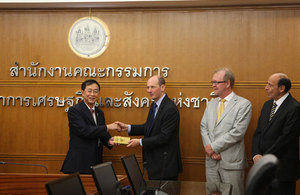“New Climate Economy Report” has been released
Economic growth and action on climate change can now be achieved together, finds global commission.

New Climate Economy Report
The British Embassy Bangkok, the Royal Norwegian Embassy, the Embassy of Republic of Colombia, The Embassy of Republic of Indonesia, the Embassy of Republic of Korea, the Stockholm Environment Institute and the Global Green Growth Institute have handed over the “New Climate Economy (NCE) Report” to Mr. Arkhom Termpittayapaisith, Secretary General of the National Economic and Social Development Board for a study review.
The NCE is a major new report released by a commission of global leaders who finds that governments and businesses can now improve economic growth and reduce their carbon emissions together. Rapid technological innovation and new investment in infrastructure are making it possible today to tackle climate change at the same time as improving economic performance.
Former President of Mexico Felipe Calderón, Chair of the Global Commission on the Economy and Climate said:
The New Climate Economy report refutes the idea that we must choose between fighting climate change or growing the world’s economy. That is a false dilemma. Today’s report details compelling evidence on how technological change is driving new opportunities to improve growth, create jobs, boost company profits and spur economic development. The report sends a clear message to government and private sector leaders: we can improve the economy and tackle climate change at the same time.
The Global Commission on the Economy and Climate comprises 24 leaders from government, business, finance and economics in 19 countries. A year-long study has been conducted by leading research institutes from China, India, the US, Brazil, Korea, Europe and Africa, advised by a panel of world-leading economists chaired by Lord Nicholas Stern – a British economist who used to work as advisor to the World Bank.
Better Growth, Better Climate: The New Climate Economy Report was presented to governments and business and finance leaders at a global launch event on 16 September at the UN headquarters in New York City, attended by United Nations Secretary General Ban Ki-Moon. This report aimed to drive action by world leaders, business executives and investors ahead of UN’s Climate Summit on 23 September in New York.
The report finds that over the next 15 years, about US $90 trillion will be invested in infrastructure in the world’s cities, agriculture and energy. That gives the world an unprecedented opportunity to drive investment in low-carbon growth, bringing multiple benefits to jobs, health, business productivity and quality of life.
Lord Nicholas Stern, Co-Chair of the Global Commission said:
The decisions we make now will determine the future of our economy and our climate, if we choose low-carbon investment we can generate strong, high-quality growth – not just in the future, but now. But if we continue down the high-carbon route, climate change will bring severe risks to long-term prosperity.
The report finds that there are now major opportunities to achieve strong growth with lower emissions in three key sectors of the global economy – cities, land use and energy. To achieve this, governments and businesses need to improve resource efficiency, invest in good-quality infrastructure, and stimulate technological and business innovation.
-
Cities: Building better connected, more compact cities based on mass public transport can save over US $3 trillion in investment costs over the next 15 years. This will improve economic performance and quality of life with lower emissions.
-
Land use: Restoring just 12% of the world’s degraded lands can feed another 200 million people and raise farmers’ incomes by $40 billion a year – and also cut emissions from deforestation.
-
Energy: As the price of solar and wind power falls dramatically, over half of new electricity over the next 15 years is likely to be in renewable energy, reducing dependence on highly polluting coal.
-
Resource efficiency: Phasing out the $600 billion currently spent on subsidies for fossil fuels (compared to $100 billion on renewable energy) will help to improve energy efficiency and make funds available for better-targeted poverty reduction.
-
Infrastructure investment: New financial instruments can cut capital costs for clean energy by up to 20%.
-
Innovation: Tripling research and development in low-carbon technologies to at least 0.1% of GDP can drive a new wave of innovation for growth. The report finds that competitive markets and consistent government policy signals are essential for businesses and investors to create low-carbon jobs and growth. By establishing a strong carbon price and a level playing field through an international climate agreement, governments can unlock new investment and innovation.
Better Growth, Better Climate sets out a detailed 10-point Global Action Plan of practical recommendations that can achieve greater prosperity and a safer climate at the same time. These measures will all lead to net benefits to the economy, even before their climate benefits are considered.
The Commission calculates that if fully implemented its recommendations could potentially achieve up to 90% of the emissions reductions needed by 2030 to avoid dangerous climate change. This would require decisive and early action by economic decision-makers.
Over the next 6 months the Commission will discuss the report with economic decision-makers across the world. It aims to stimulate stronger action by governments and businesses to drive growth and emissions reductions together.
Further information
The “Better Growth, Better Climate” report, including info graphics and other materials, is now available online at www.newclimateeconomy.report